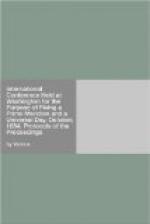I would answer, first, that the metre, as far as the measure is derived from the dimensions of the earth, is not French, and it was precisely to take away this character of nationality that those who fixed on the metre sought to establish it on the dimensions of the earth itself. What is French is the particular metre of our national archives, which exhibits a very slight difference from that which our actual geodesy would have given us. Also, I think that if, at the time of the adoption of the Convention du Metre, in which the nations of Europe participated, we had slightly changed the length of our standard to make it agree with the result of actual geodetic measurements, we should have done an excellent thing in depriving this measure of any shadow of nationality. I agree with my honorable colleague that if a few slight changes adopted by common accord could perfect the metrical system, we French ought to have no motive for opposing it. We have the honor of having invented a system of measures which, being based upon considerations of a purely scientific nature, has been accepted by all. Therefore if it can be said with truth that the metre of the Archives of Paris is French, (not intentionally, but because it bears the mark of an error of French origin,) it is an international metre, by the same title that the discovery of the satellites of Mars made by my friend, Prof. Asaph Hall, whom I have the pleasure of seeing here, is scientific and of a universal nature. The metre—equal to the ten-millionth part of the distance from the equator to the pole—is no more French than that distance itself, and, nevertheless, if the Americans, English, or Germans had measured it, they would each have arrived at a slightly different metre.
Now, my honorable colleague adds that a neutral meridian appears to him a myth, a fancy, a piece of poetry, so long as we have not exactly settled the method of determining it. I shall disregard the expressions which my honorable colleague has thus introduced into the discussion, because this discussion should be serious. It is plain that Prof. ABBE did not thoroughly apprehend the explanations which I gave of the proper methods of fixing the initial meridian, and of the conditions which make a meridian neutral; but I return to them, since I am invited to do so. Our meridian will be neutral if, in place of taking one of those which are fixed by the existing great observatories, to which, consequently, the name of a nation is attached, and which by long usage is identified with that nation, we choose a meridian based only upon geographical considerations, and upon the uses for which we propose to adopt it.




